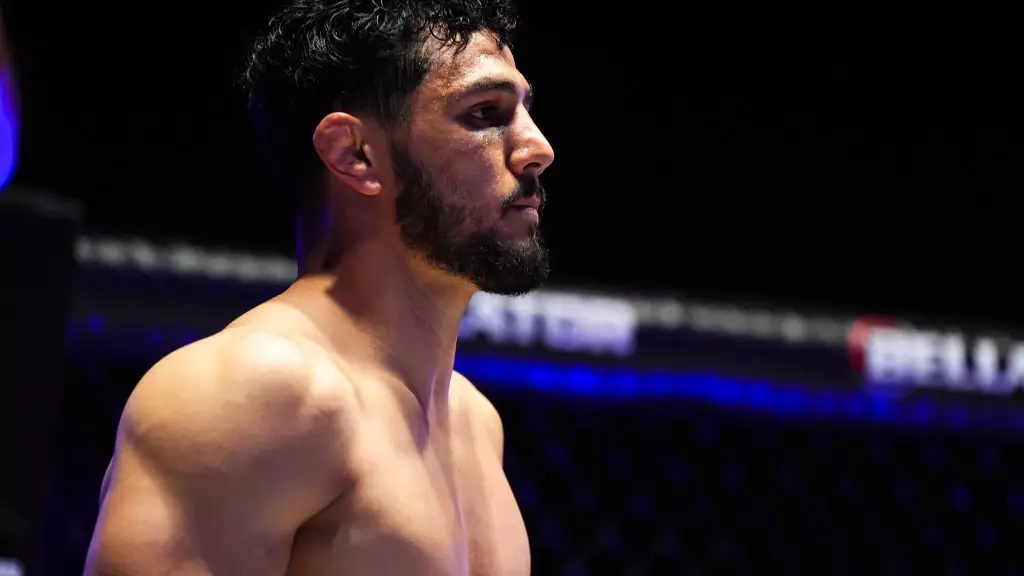In the tumultuous world of mixed martial arts (MMA), athletes often find themselves at the mercy of their contracts, which can sometimes become detrimental to their careers. Such is the case with Aaron Pico, a promising fighter who feels trapped in a situation that is preventing him from pursuing bigger opportunities. Having achieved a notable victory over Henry Corrales in February, Pico has not been active in the cage, citing that the Professional Fighters League (PFL) is hindering his ambitions to join the Ultimate Fighting Championship (UFC).
Aaron Pico’s career trajectory has been one of potential and promise, marked by both impressive performances and significant setbacks. However, despite his eagerness to continue competing, he finds himself in a protracted standoff with PFL co-founder Donn Davis, who he claims refuses to grant him a full release from his contract. This predicament highlights the often frustrating complexities of fighter contracts within professional sports, where the athletes must navigate not only their performance but also the intricacies of contractual obligations.
Pico’s assertions regarding his contractual obligations with PFL indicate a vital issue plaguing many fighters: the rights of promotion companies to match offers. “I am a free agent,” he stated confidently, “but there’s only one little thing… that PFL has the right to match any offer I receive.” This clause effectively transforms his status as a free agent into a waiting game, a situation that is further exacerbated by his longing to compete at the highest echelons of the sport. The UFC, known for hosting elite-level competition, is where Pico dreams of taking his talents, yet he confronts obstacles imposed by his current promotion.
The emotional weight of his situation is palpable, as he expresses his frustration openly. His longing for a release is not just a matter of career development; for Pico, it symbolizes a lost opportunity for growth as an athlete and a means of securing his livelihood. He notes the frustrating cycle of promises made and broken by PFL management, illustrating a pattern of communication breakdowns. Such discrepancies raise questions about organizational integrity and fighter trust, essential elements in maintaining a positive workplace for athletes.
Pico’s narrative reveals more than just his own plight; it showcases a cautionary tale applicable to many fighters navigating the industry. He recounted how he was once filled with hope after a conversation with Davis, who made promises about a title fight in California. His optimism quickly turned to disillusionment when the alleged fight opportunities evaporated, leaving him in a state of uncertainty. “I was getting ready to finally fight for the title… but then I never heard anything from them,” he lamented.
This is not just a reflection of personal frustration; it’s an indictment of the unfulfilled commitments that have become commonplace in fighting contracts. The discrepancy between promises made in fleeting conversations and the realities of fight bookings can lead to disillusionment among fighters, many of whom depend on these fights not only for professional recognition but also for financial security.
As Pico awaits potential offers from the UFC, he grapples with the reality that the exclusive matching period could extend a year, potentially sidelining him for an additional two years. This harsh landscape emphasizes the vulnerability that many fighters face when promotions hold contractual leverage. His plea for freedom from the restrictions imposed by PFL is more than a personal request; it’s a call for fair treatment within the MMA landscape.
He expresses his distrust of Davis, acknowledging that while Davis may personally be a good individual, the business side of MMA has overshadowed the athlete’s best interests. “I don’t trust him,” Pico commented bluntly, exposing a schism that can emerge between fighters and promotion executives. At its core, this highlights an imbalance of power that can lead to a detrimental impact on a fighter’s career and mental health.
Aaron Pico’s unfolding storyline in MMA encapsulates the struggles of many fighters who find themselves caught in restrictive contracts. His desire for a release from PFL reflects a broader issue: the need for better advocacy for fighters within the sport. As athletes like Pico strive for success, their journeys should not be marred by bureaucratic hurdles and unfulfilled promises.
The unique challenges faced by fighters underscore the importance of transparency, communication, and trust within the promotional ecosystem. As more athletes step into the spotlight, it is crucial for organizations to prioritize their well-being and career aspirations, lest they risk stifling the very talent that fuels their success. Pico’s story is one that speaks to the heart of the fight industry—a compelling reminder of the urgency for change in the way MMA contracts affect fighters’ futures.

